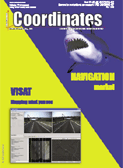
Fifteen years ago people hardly had mobile phones; today it seems awkward if you do not possess one. After this success story the IT sector has its new gadget: Navigation systems. Similar to the mobile phone market it is growing tremendously.
Market structure
That fierce competition has served well to bring prices down. So, nowadays most players are sourcing their products from sub-manufacturers in China. However, this means that anybody can enter the market and source easily navigation devices, when the volume commitment is big enough.

Tsunami is a series of traveling waves of extremely long wavelength generated primarily by earthquake occurring below and near the ocean floor. Underwater volcanic eruptions and landslides can also generate tsunami. Though the return period of tsunami is infrequent, the destruction done by tsunami is widespread, in terms of life and property. The most devastating tsunami occurred in December, 2004 affected the coastal countries of the entire Indian Ocean. It became necessary to set up a system in India to monitor seismic activity and sea level to evaluate potentially tsunamigenic waves and disseminate tsunami alert or warning.

With the continued growth of urban centers all around the world, city planners are required to keep up with up-to-date geographical at a faster rate. This has led to the establishment of spatially-referenced Geographic Information Systems (GIS) for a variety of municipal applications. This information, however, is expensive to obtain by conventional methods. In addition, conventional methods supply only point solutions and are therefore not suited to support the increasingly complex requirements posed by urban centers in a timely fashion. Satellite remote sensing and aerial photogrammetry are two methods which can provide various GIS information at high rates and reasonable cost. However, with the first method, the associated accuracy is not suitable for many applications, and in the second case the near vertical field of view provides only part of the information required.

VISAT: Mapping what you see
NASER EL-SHEIMY, TAHER HASSAN AND MARTIN LAVIGNE
A sigh of relief
Early warning system for Tsunami in the Indian Ocean
SHAILESH NAYAK
Navigating the navigation market
ALDEN LEE
Understanding Galileo
HENDRIK THIELEMANN
Integrated system for disaster mitigation management
SQUADRON LEADER MUDIT MATHUR AND WING COMMANDER YD ANDURKAR
May 2007
International Conference on Integrated Navigation System
28-30 May, Saint Petersburg,
Russia elprib-onti@telros.net
Geoinformation for Disaster Management (Gi4DM2007)
23-25 May, Toronto, Canada
junli@ryerson.ca
5th International Symposium on Mobile Mapping Technology
28-31 May, Padova, Italy
naser@geomatics.ucalgary.ca
June 2007
Navigation Europe 2007
6-7 June 2007 in Amsterdam.
www.telematicsupdate.com/naveurope2007/
21st Pacific Science Congress
12-16 June, Okinawa, Japan
psc21@to.jim.u-ryukyu.ac.jp.
Spatial Data Quality 2007 5th International Symposium
13-15 June, ITC, Enschede,
The Netherlands
issdq2007@itc.nl
27th …
Galileo – the European Programme for Global Navigation Services for civil purposes is an initiative led by European Union. We provide regular updates to our readers on the Galileo programme.

Consumer demand for GPS increasing: CEA report
According to a research report by the Consumer Electronics Association (CEA), GPS – Exploring Ownership and Interest revealed an 80 percent owner satisfaction rate, which was strongly influenced by the ease of use and display quality of the devices, which are used primarily for navigation assistance in a vehicle. While GPS ownership is still relatively small at 18 percent of online consumers, the research demonstrates shipment revenues nearly tripling between 2005 and 2006. Nearly 24% of online consumers are planning to purchase a GPS device within the next year, spending an average of $410 resulting in sales reaching $4.1 billion in 2007. The study shows that 33 percent of future GPS buyers are interested in owning a cell phone with a GPS. Rest of the other uses are hiking 18%, walking16%, boating 14% biking 7%, running 6% and flying 4% www.webwire.com

NRCan offers digital topographic data for free
As of April 1, 2007, Natural Resources Canada (NRCan) began offering its electronic topographic mapping data for free over the Internet. It is now permitting people to freely redistribute this data, helping to ensure that users receive accurate and consistent information. It will make its data collections available through GeoGratis (geogratis.gc.ca), which is a portal, provided by the Earth Sciences Sector of NRCan.

Mobile industry set to boom with GPS technology
As per the RNCOS report, “Globally, the GPS market is expected to exceed US$ 30 Billion by 2008. The two segments under this technology namely people tracking & handset market will have maximum growth rate, about 9%.” Mobile industry is set to boom in 2007 with mobile giants, application developers, and OS managers planning to introduce various large-scale rollouts of GPS technology. Most phone manufacturers will introduce devices enabled for navigating with a GPS like Nokia has plans to introduce a personal mapping program that’ll let users to send messages to each other and also have instructions on how to congregate, delivered to the handset. www.rncos.com

Sunderban, one of the largest mangrove forests in the world, is located in the deltaic region of Ganga and Bramhaputra rivers in India and Bangladesh. The impact of biotic and abiotic factors on Sunderban is enormous (Rao, 1959), due to which the area has got reduced to nearly half during the past few centuries (Blasco, 1975; Naskar and Guha Bakshi, 1982; Naskar, 1985).
The mangrove-forested area of Sunderban (including portions in Bangladesh) was recorded to be 20,000 km2 by Clark (Annon., 1895), and 17,500 km2 by Prain in 1903. Grif?th (1982) reported that mangrove forests in the Sunderban covered over 4264 km2 and 4109 km2 respectively in India and Bangladesh during early eighties. The present area of Sunderban is 2081 km2 (Anon., 2001).









 (5.00 out of 5)
(5.00 out of 5)